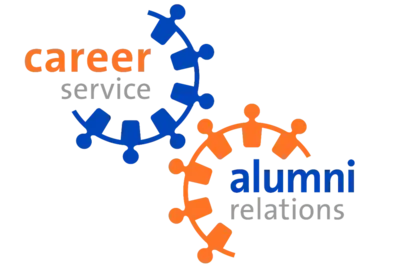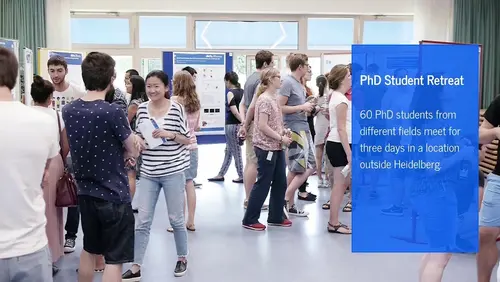Program Overview
General Information
The typical duration of the doctoral studies at the DKFZ is three to four years. More than 52 % of our PhD students are international, so the curriculum is in English and includes scientific and professional training.
Degree
Once you have completed and defended your PhD project and attended the necessary courses, you are granted your degree by the university with which you initially registered. For most PhD students at the DKFZ, the doctoral degree is awarded by the Biosciences Faculty, Medical Faculty or Physics Faculty of the prestigious Heidelberg University, the oldest university in Germany (founded in 1386). The degree you are awarded depends on your area of research and the university faculty you registered with. In Germany, although the term "PhD" is used to refer to the doctoral project (as in this website), the actual doctoral title that is conferred is not the Doctor of Philosophy (Ph.D.), but rather an equivalent doctoral title. For example, a Doctor of Natural Sciences (Dr. rer. nat.) is conferred by the Biosciences or Physics Faculties and a Doctor of Human Sciences (Dr. sc. hum.), or in some cases where the candidate has a medical background a Doctor of Medicine (Dr. med.) is conferred by the Medical Faculty.
Funding
All PhD positions at the DKFZ are fully funded for (at least) three years. The salaries are competitive by (inter)national standards. There is no tuition fee.
Candidates awarded a PhD Program position through the biannual selection rounds are funded by a DKFZ PhD contract, which includes social security contributions (pension, health insurance etc). The amount of this contract is approximately equivalent to a TVöD contract with 65% working time, in the E13 level. Candidates may also receive offers of funding from a PhD supervisor directly, or obtain their own scholarship from foundations or funding agencies such as the German Academic Exchange Service (DAAD) and their Graduate School Scholarship Programme (GSSP); Boehringer Ingelheim Fonds; Deutsche Studienstiftung; Volkswagenstiftung; China Scholarship Council (CSC)…
All PhD students at the DKFZ are enrolled in the DKFZ International PhD Program, regardless of how they are funded.
Research Projects

Research at the DKFZ is highly interdisciplinary and our over 500 PhD students are working in research groups at the DKFZ in Heidelberg and Dresden, as well as at our partner sites within the German Cancer Consortium, HI-TRON, and at the National Centers of Tumor Diseases. Our research is dedicated to unravel the causes and mechanisms of cancer development and to identify groundbreaking tools for diagnosis, treatment, and prevention. This interdisciplinarity is reflected in the wide range of academic backgrounds of our PhD students, which includes (molecular) biology, biochemistry, chemistry, physics, mathematics, computational biology, data/computer science or epidemiology/public health studies and psychology.
Follow the links below to find out more about our research:
Support for PhD Students
PhD student welfare at the DKFZ has top priority. There is a dedicated PhD Program Office to support you before and during your time as a PhD student at the DKFZ. This office is staffed by a team of seven, headed by Dr. Lindsay Murrells, the PhD Program Manager. The PhD Program Office is concerned with PhD student affairs at the DKFZ - including the bi-annual candidate selections - and takes care of PhD students’ concerns. It also organizes events like the Graduation Ceremony.
You can contact the PhD Program Office by email.
If you're an international PhD student moving to Heidelberg or one of our partner sites in Germany, to start your PhD at the DKFZ, you might also find the resources offered by our International Staff Services helpful for planning your stay.

The DKFZ also has a Career Service with the aim to support all Master's, PhD students and Postdocs in planning their professional future. For more information, please check the DKFZ Career Service page.
The network of DKFZ PhD Alumni is growing every year and our Alumni Relations Office supports you to stay in touch with your former colleagues.
But that’s not all: The PhD Community at the DKFZ is very active and organised in dedicated PhD Student Teams, led by the PhD Council. The teams help new PhD students to settle in both at work and in Heidelberg, and organise many social and scientific networking events.
For more information about the PhD Council and Teams, please visit Life as a DKFZ PhD Student providing useful advise and information related to graduate studies.
The "Helmholtz Doctoral Guidelines" define standards for the optimal design of doctoral training. These guidelines are also implemented at the DKFZ, one of the 19 research centers of the Helmholtz Association.
For help in the rare instances when things go wrong, the PhD Program also has ombudspeople to offer assistance. As DKFZ scientists, they can provide confidential advice and help to solve the issue at hand.
Scientific Mentoring through Thesis Advisory Committees (TAC)
PhD students are supervised by group leaders and department heads of the DKFZ. A Thesis Advisory Committee (TAC) – personal to each student – provides further support during the whole duration of the PhD. It consists of the supervisor and at least two other senior scientists, one of whom is external to the DKFZ. TAC meetings take place once a year to provide students with feedback on research already conducted and to give advice and suggestions for future projects. The students prepare a short written report and give a presentation of their work.
Scientific and Professional Skills Training
All PhD students complete the PhD Course Program, which includes lectures, seminars and events and also provides lots of opportunities for PhD students to tailor their education to meet their own needs and interests.
Within the first few months of joining the PhD Program, PhD students are supported through a comprehensive training program, starting with a one-week PhD Initial Course.
The PhD Initial Course is a great way to get to know the research, resources and infrastructure at the DKFZ and receive training in aspects such as planning the PhD project, intercultural communication and an introduction to design thinking. It's also a great way for PhD students to start to build their scientific network and get to know other PhD students from all different DKFZ groups/divisions and partner sites who started their PhD at around the same time. See the movie below for some impressions.
Often, it’s easy to get so involved in your own research project you lose sight of the big picture. This lecture series, which takes place once a week during semester time, is designed to give every PhD student an overview of the current state of cancer research.
An important part of PhD training is learning to explain your research to other scientists and to discuss results and hypotheses. Therefore, PhD students present their work regularly in larger division seminars.
Besides your scientific work during your PhD, you can gain additional skills by attending scientific and professional skills courses, such as "confocal microscopy", "scientific writing" or "how to present in English". Many such courses are organized by the DKFZ, but PhD students are also encouraged to attend externally-organized courses.
Organized for PhD students, by PhD students this is a great chance to take a step back from the lab bench and find out what your colleagues are working on. PhD students from different fields meet for three days in a location outside Heidelberg to exchange ideas about recent developments in science. The three-day program includes talks from fellow PhD students and guest speakers, poster sessions and a team event. The short film below shows some impressions from the 2017 retreat.
Every year, there is a large PhD poster presentation, organized in the same style as a scientific conference, where PhD students have the chance to present their work and get feedback from other students and scientists, in addition to finding out what other students at the DKFZ are working on.
PhD Students are required to present their work (with either a poster or talk) at an international conference. PhD students often have the opportunity to travel to conferences abroad, but with so many scientific institutes in and around Heidelberg, you’ll also find excellent international conferences taking place locally.


Where do DKFZ PhD Alumni work now?
After a PhD at the DKFZ, our alumni take on different types of jobs worldwide. Here are some examples.

Examples of where our DKFZ PhD alumni who took the academic road went for their Postdoc:

Many of our alumni also went on to a career in industry, in many different areas: research & development, regulators affairs, sales, in-house consulting…
